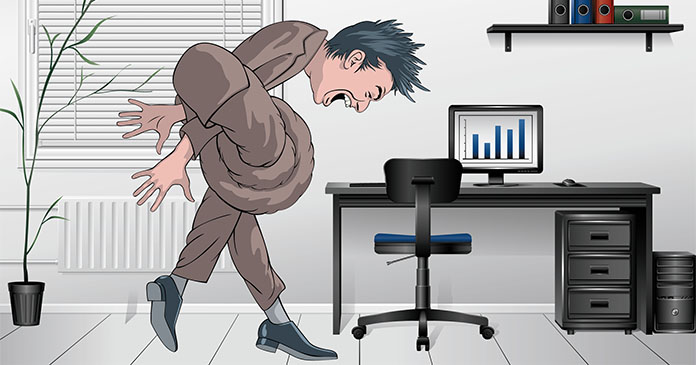The survey of nearly 1,000 adults found that 77 percent of Americans are stressed about work. What are workers stressed about?
- 14 percent cite low pay
- 11 percent, commuting
- 9 percent, an unreasonable workload
- 9 percent, fear of being laid off
- 8 percent, annoying co-workers
- 5 percent, an annoying boss
- 5 percent, poor work-life balance
- 4 percent, lack of opportunity for advancement
“Most employers are becoming well aware of the need to address rising employee stress, and those who don’t address it are likely to suffer lower morale and productivity,” said Wendy Cullen, VP of employer development for Everest College.
“The impact of stress cannot be overstated,” said Davis K. Brimberg, a Los Angelesbased psychologist who focuses on workplace issues. “Almost all psychological problems are worsened by it.”
So what are Americans to do? Take a deep breath. Now exhale slowly.
You’re probably not aware of it, but your heart has just slowed down a bit. Not to worry; it will speed up again when you inhale. This regular-irregular beat is a sign of a healthy interaction between heart and head. Each time you exhale, your brain sends a signal down the vagus nerve to slow the cardiac muscle. With each inhale, the signal gets weaker and your heart revs up. Inhale, beat faster. Exhale, beat slower.
It’s an ancient rhythm that helps your heart last a lifetime. And it’s the first lesson in managing stress and avoiding burnout.
Remember to breathe
Evolution has bequeathed to our brains a variety of mechanisms for handling the ups and downs of life, from built-in chemical circuit breakers that shut off the stress hormones to entire networks of nerves whose only job is to calm you down.
The problem is in our always wired, always on-call world that they all require that you take regular breaks from your normal routine—and not just an occasional weekend trip. You can try to ignore the biological need to periodically disengage, but there’s growing evidence that it will eventually catch up with you. Insurance claims for stress, depression and job burnout are now the U.S.’s fastest-growing disability category.
Making matters worse, Americans tend to cope with stress in all the wrong ways. A survey by the advocacy group Mental Health America found that we frequently deal with chronic stress by watching television, skipping exercise and forgoing healthy foods. The problem with these coping mechanisms is that they keep you from doing things that actually help buffer your stress load—like exercising or relaxing with friends or family—or add greater stress to your body.
Indeed, using many of our most cherished time-saving gadgets can backfire. Cell phones and mobile email devices—to give just two examples—make it harder to get away from the office to decompress. Working from home may, in some cases, exacerbate the situation because it isolates employees while simultaneously blurring the line between work and leisure.
We also have misconceptions about who gets stressed and why. Twenty years ago, psychologists almost exclusively blamed job stress on high workloads or lack of control on the job.
More recent studies, says Christina Maslach, a pioneer in burnout research at the University of California, Berkeley, show that unfairness and a mismatch in values between employees and their companies play an increasing role in triggering stress. “Probably one of the strongest predictors is when there’s a vacuum of information—silence about why decisions were made the way they were,” Maslach says.
Stress alters your chemistry
For years psychologists have concentrated on the behavioral symptoms of burnout: lost energy, enthusiasm and confidence. Now, thanks to new brain scans and more sophisticated blood tests, scientists can directly measure some of the effects of stress on mind and body, often with surprising results.
You are probably familiar with the signs of an adrenaline surge (racing pulse, hairs on the neck standing on end), which evolved to help us fight or flee predators and other dangers. And you may have heard of cortisol, another stress hormone, which is produced more slowly than adrenaline and lingers in the bloodstream longer. But did you know that too little cortisol in your bloodstream can be just as bad as too much? Or that comfort foods, while soothing in the short term, can sabotage your long-term stress response by increasing the number of inflammatory proteins in your body?
Scientists know the most about cortisol because until now that has been the easiest part to measure. “But when one thing changes, all the others change to some degree,” says Bruce McEwen, a neuroendocrinologist at Rockefeller University who has spent decades studying the biology of stress, primarily in animals. So just because you see an imbalance in one area doesn’t mean you understand why it is happening. “We’re learning that post-traumatic stress disorder (PTSD), burnout, chronic fatigue syndrome and fibromyalgia are all related in some way,” McEwen says.
You can’t avoid stress
Even getting out of bed can be tough on the body. Several hours before you wake each morning, a tiny region at the base of your cerebrum called the hypothalamus sends a signal that ultimately alerts your adrenal glands, which sit on top of your kidneys, to start pumping out cortisol, which acts as a wake-up signal. Cortisol levels continue to rise after you become conscious in what is sometimes referred to as the “Oh! It’s another day” response. This may explain why so many heart attacks and strokes occur between 6 a.m. and 8 a.m.
Because cortisol is a long-acting hormone, you can dally under the covers a bit without losing any steam. But your brain is already taking steps to protect you from the shock of starting a new day. Rising cortisol levels signal the hypothalamus to stop sounding the alarm. Other parts of the brain chime in, and eventually the adrenal glands ratchet down their cortisol production. In other words, the brain’s stress response contains its own off switch.
Most people’s cortisol, as measured by a saliva test, peaks a few hours after waking. Levels then gradually decline during the course of the day, with a few blips scattered here and there. That pattern typically changes, however, in people who are severely depressed. Their cortisol level still rises early in the morning, but it stays high all day long. It’s as if their hypothalamus forgotten to turn off the stress response. Intriguingly, people who are sleep deprived also exhibit a high, flat cortisol level.
Researchers figured something similar was happening in burnout victims. But rather than finding a prominent cortisol peak, investigators discovered a shallow bump in the morning followed by a low, flattened level throughout the day. Intriguingly, such blunted cortisol responses are also common among Holocaust survivors, rape victims and soldiers suffering from PTSD. The difference seems to be that people with PTSD are much more sensitive to cortisol at even these low levels than those with burnout. “We used to blame everything on high cortisol,” says Rachel Yehuda, a neurochemist and PTSD expert at the Mount Sinai School of Medicine in New York City. “Now we can blame things on low cortisol as well.”
Stress can age you before your time
Scientists have long suspected that unremitting stress does damage to the immune system, but they weren’t sure how. Then researchers at the UC San Francisco, looked at white blood cells from a group of mothers whose children suffered from chronic disorders like autism or cerebral palsy. The investigators found clear signs of accelerated aging in those study subjects who had cared the longest for children with disabilities or who reported the least control over their lives.
Changes took place in microscopic structures called telomeres, which are often compared to the plastic wrappers on the ends of shoelaces and which keep chromosomes from shredding. As a rule, the youngest cells boast the longest telomeres. But telomeres in the more stressed-out moms were significantly shorter than those of their counterparts, making them, from a genetic point of view, anywhere from nine to 17 years older than their chronological age.
Stress is not equal opportunity
In 1995, scientists at the University of Trier in Germany subjected 20 male volunteers to a situation guaranteed to raise their stress levels: participating in a mock job interview and solving arithmetic problems in front of strangers who corrected them if they made mistakes. As expected, each subject’s cortisol level rose at first. But by the second day of the trial, most of the men’s cortisol levels did not jump significantly. Experience had taught them that the situation wasn’t that bad. Seven of the men, however, exhibited cortisol spikes every bit as high on the fourth day as the first. Only by the fifth day did their stress reaction begin to disappear.
More recently, researchers have found that subjects with low self-esteem are more vulnerable to stress. Jens Pruessner at McGill University in Montreal believes that the hippocampus, a finger-size structure located deep in the brain, is at least partially responsible. It turns out that the hippocampus, which helps you form new memories and retrieve old ones, is particularly sensitive to the amount of cortisol flooding your cerebrum. So when cortisol levels begin to rise, the hippocampus sends a set of signals that help shut down the cortisol cascade.
Using several different types of brain scans, Pruessner has shown that people who test below average on self-esteem also tend to have smaller-than-average hippocampi. The differences become clear only when you compare groups of people, Pruessner notes, so you can’t look at any single person’s brain scan and determine whether he or she has low self-esteem. But when you look at overall results, they suggest that a smaller hippocampus simply has more trouble persuading the rest of the brain to turn off the stress response.
Still unclear is how the body goes from having repeated activation of the stress response to showing the typically blunted cortisol levels of someone suffering from burnout. “We are still studying this,” says Samuel Melamed of Tel Aviv University. “But if there is no relief and the cortisol stays up for long periods of time, the body stops responding and readjusts the level.”
More than one way to relieve stress
This is probably the toughest lesson to internalize because when stress overwhelms the system, your choices often seem more limited than they are. Behavioral scientists have a name for this psychological reaction. They call it learned helplessness, and they have studied the phenomenon closely in laboratory rodents, whose nervous system bears striking similarities to that of humans.
Here’s how the experiment works: if you provide mice with an escape route, they typically learn very quickly how to avoid a mild electrical shock that occurs a few seconds after they hear a tone. But if the escape route is blocked whenever the tone is sounded, and new shocks occur, the mice will eventually stop trying to run away. Later, even after the escape route is cleared, the animals simply freeze at the sound of the tone—despite the fact that they once knew how to avoid the associated shock.
Obviously, humans have more intellect at their disposal than mice, but the underlying principle remains. When too many of the rules change, when what used to work doesn’t anymore, your ability to reason takes a hit. Just being aware of your nervous system’s built-in bias toward learned helplessness in the face of unrelieved stress can help you identify and develop healthy habits that will buffer at least some of the load.
The one thing you should not do is ignore the risks. Animal research has shown that there is a relatively small window for reversing the physiological effects of chronic stress. Studies of people are starting to produce similar results. Once a person’s cortisol level gets completely blunted, it seems to stay that way for years. You owe it to yourself and your loved ones not to let that happen.
Author: Christine Gorman, writer and editor for Scientific American















